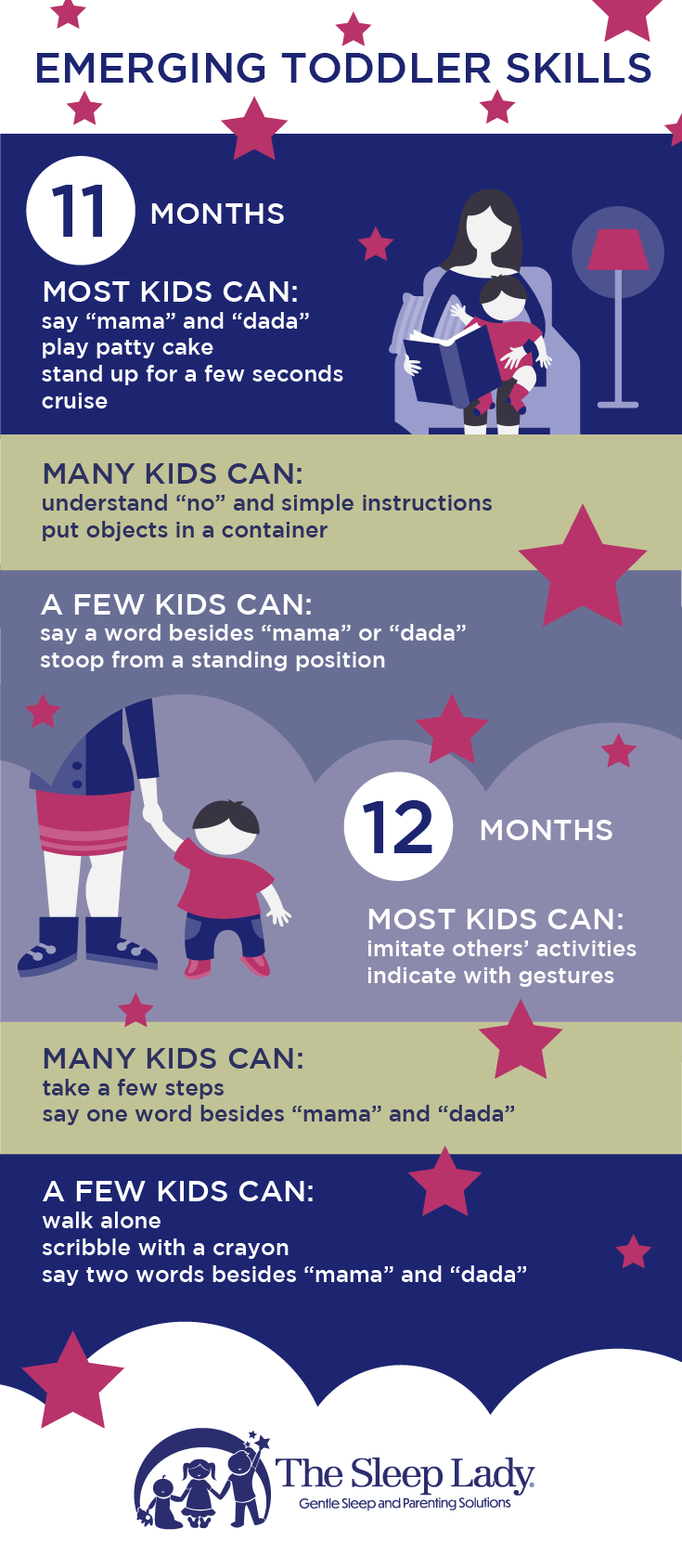12 Month Sleep Regression — Emerging Toddler Skills Might Be to Blame
12 Month Sleep Regression — Emerging Toddler Skills Might Be to Blame
As your baby approaches 12 months, it’s time to talk about sleep regressions — AGAIN! Do you sometimes wonder if your baby’s sleep regressions will ever end? Will you EVER be able to count on a good night’s sleep for you and your child? You know you’re facing a 12 month sleep regression when your child is experiencing:
- Increased fussiness
- Multiple night wakings
- Fewer naps or short “disaster naps”
- Changes in appetite
Developmental Milestones Bring Sleep Regressions
Let’s face it. Sleep disruptions come with any major change in your baby’s life. Travel, teething, a cold, moving to a new home — even a big day at a new playground can all disrupt your child’s ability to calmly go to sleep and stay asleep for the night. At 12 months, major developmental changes are happening in your baby’s body and brain. Their internal world is expanding how they see and interact with their external world and these changes are exciting and sometimes a little overwhelming for them. At 12 months your baby is either doing or getting ready to do these things:
- Say a few words, including ‘mama’ and ‘dada’
- Stand on their own
- Take a few steps, holding on to something or on their own
 Naps are the First to Go
Naps are the First to Go
The most common problem parents see at the 12 month sleep regression is a complete disruption of babies’ naps. Thanks to all of the excitement of their developmental progress, babies at this age will FIGHT their naps. It may even look like they are transitioning to only needing one nap a day. Don’t be fooled! It’s a temporary phase, just like the sleep regression itself.
The typical age for babies to drop to one nap instead of two per day is between 14 and 15 months. At 12 months, keep offering two naps and do your best to help your child settle into sleep by having a regular nap time and a soothing nap routine. Use The Shuffle strategies to offer your child some support and comfort as they fall asleep or when they wake early.
Want to know more about those valuable naps?
Read: Nap Training: How to Get Good Naps for Good Nights
Is your toddler resisting sleep?
We can tell you why and how to fix it in Gentle Sleep Solutions - an online sleep training e-Course!
Get Some SleepExtra Support Helps
Watching your baby struggle with sleep is hard. Losing sleep yourself is hard, too. Remember that just like the 4 month, 7 month, and 9 month sleep regressions, this is a temporary phase. It’s also a phase where your baby may need extra support while they weather the frustration and excitement of learning new skills. You can help them get through the sleep regression faster and more smoothly:
- Offer comfort and reassurance — extra hugs and cuddles help
- Feed your baby more frequently if he seems extra hungry — growth spurts can be part of a sleep regression
- Avoid over-tiredness — stick to your nap routine and consider an earlier bedtime if she seems extra tired or extra fussy in the evening
- Avoid old (or new!) bad habits — don’t resort to rocking or feeding your baby to sleep. Stay nearby at bedtime and use The Shuffle to comfort and reassure him
It’s hard to believe now when nights and naps are undependable but with consistency and some good sleep coaching you’ll soon be out of the woods – usually in no more than 2-3 weeks.
Want to know more about all the common regressions?
Read: Sleep Regressions at All Ages — What to Do When Sleep Stops
The post 12 Month Sleep Regression — Emerging Toddler Skills Might Be to Blame appeared first on The Sleep Lady.
https://ift.tt/3lI20ut from The Sleep Lady https://ift.tt/37tmSke



Post a Comment